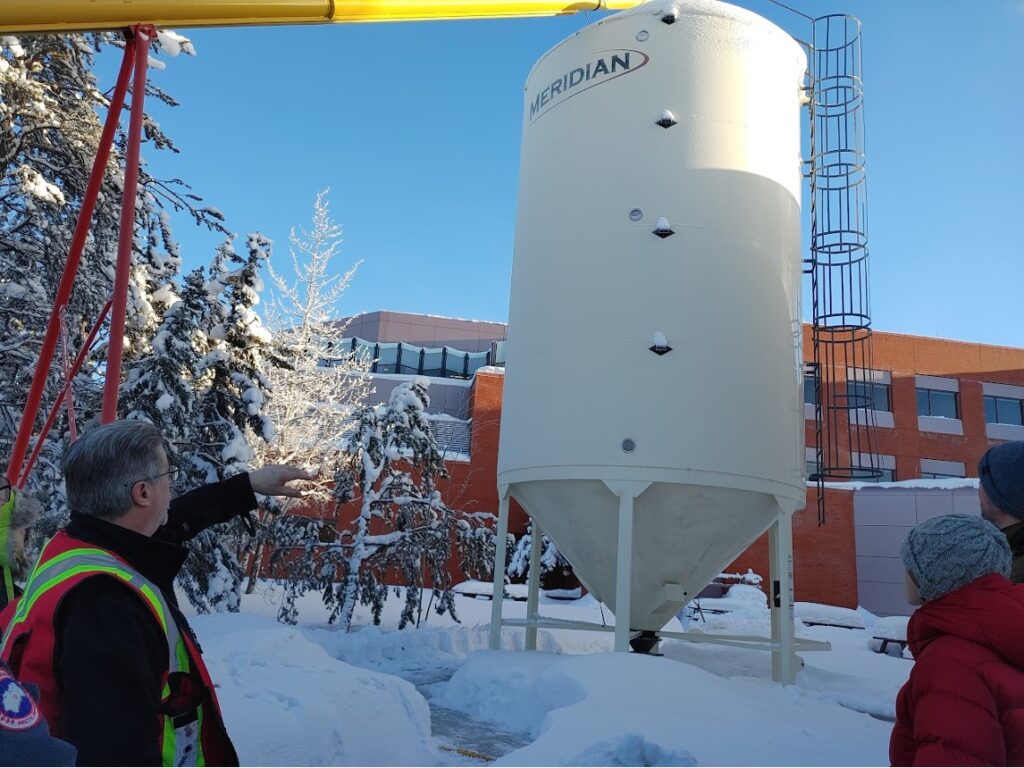
N.W.T. Biomass Week explores solutions for energy transformation in Canada’s North
February 21, 2023
By Mark Heyck
This year's Northwest Territories Biomass Week saw a record turnout.
 Conference tour participants experienced the power of pellets at Stanton Legacy Biomass in Yellowknife. The tank holds 80 tonnes of pellets; and the boilers use four tonnes of pellets per day. Photo: Arctic Energy Alliance.
Conference tour participants experienced the power of pellets at Stanton Legacy Biomass in Yellowknife. The tank holds 80 tonnes of pellets; and the boilers use four tonnes of pellets per day. Photo: Arctic Energy Alliance. More than 350 delegates from across Canada and around the globe met virtually for the Northwest Territories (N.W.T.) Biomass Week Jan. 30 to Feb. 3, co-hosted by the Arctic Energy Alliance and the Wood Pellet Association of Canada with support from media partner Canadian Biomass.
As the Honourable Dan Vandal, Minister of Northern Affairs Canada, pointed out in his opening remarks, clean energy, like biomass, means better health and better environmental outcomes for northern and Indigenous communities while creating economic opportunities and jobs for residents.
Every day, we see more and more of the real-life impacts of climate change, but perhaps nowhere as profoundly as in the North. The North and the Arctic are warming at three times the global rate, with significant impacts on infrastructure. We know that reducing our reliance on fossil fuels is key to fighting climate change. The N.W.T. 2030 Energy Strategy has set ambitious but realistic targets, including reducing GHG emissions from electricity generation in diesel-powered communities by an average of 25 per cent and increasing the share of renewable energy used for space heating to 40 per cent.
Minister Vandal noted that, “The made-in-Ottawa approach to the North into the Arctic has limited the region’s possibilities. We need to put the future in the hands of the people who live in the region and experience climate change most profoundly.”
We in the North couldn’t agree more. Northern communities want to have control over their own energy systems with local bioenergy suppliers, rather than having to rely on importing fossil fuels from thousands of kilometres away. Cost reduction is also a key motivator, particularly for communities that use wood pellets, with significant cost savings compared to diesel fuel.
The record attendance at this year’s conference is not the only indicator of the uptake of biomass in the Northwest Territories. Normally, we would see most of the projects under our Alternative Energy Technologies program in solar, but over the past year, we provided about $360,000 in funding to 18 biomass projects. This funding from the Governments of Canada and the Northwest Territories is critical if we are going to transition to cleaner energy like biomass.
As we heard from the president of our board, Robert Sexton, biomass is one of the main sources of primary energy in public buildings in Yellowknife. In fact, 33 per cent of territorial government buildings in the city are heated with wood pellets, playing a significant role in reducing greenhouse gas emissions and saving money for taxpayers.
The conference ran every day of the week for three hours each day. You can view the presentations here to learn from 20 biomass champions and experts who talk about the benefits of biomass, opportunities for existing and new residential construction, success stories in institutional, industrial, and commercial buildings, and case studies in district heating. Experts also provided practical tips on installing and maintaining biomass systems. Of course, there’s nothing like hands-on experience so the conference included field trips in Hay River and Yellowknife where we saw the systems in operation.

Elvis Brown, from Ventura Stanton Partnership Ltd, in front of the opened door of the pellet boiler at Legacy Stanton Biomass in Yellowknife. Photo: Arctic Energy Alliance.
As we continue to move forward, it will take all of us working together to ensure we are closing gaps in the North. Events such as Biomass Week are important for generating ideas and creating opportunities for how we collaborate. They also reinforce the importance of putting the future in the hands of the people who live in the region and are at the frontlines of climate change.
Mark Heyck is the executive director of the Arctic Energy Alliance.
Print this page